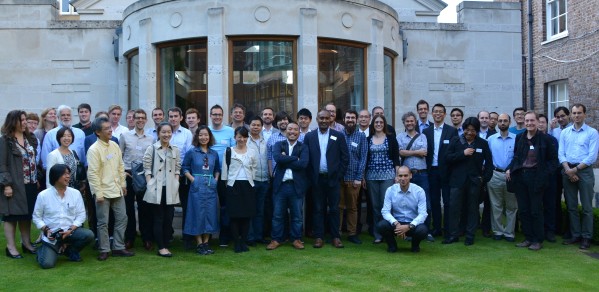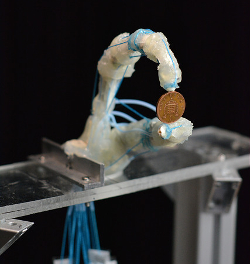
Sidney Sussex College was home to a joint workshop on bio-inspired robotics last year that brought together leading robotics scientists and engineers from the UK and Japan.
Nature has inspired scientists and engineers to develop improved technology throughout the years. The field of bio-inspired engineering is increasing in importance as technology and society become more intertwined.
The field is currently undergoing a paradigm shift from rigid robots to soft ones taking inspiration from biological systems. The soft tissues, skin and musculature of animal bodies is essential for their ability to adapt and function in complex environments; likewise, developing soft robots enables them to become more flexible, intelligent, safe and affordable. Soft technologies can lead to wider adoption of robots in human environments, which is seen as one of the most needed requirements in rapidly aging and rapidly developing societies, for example in elderly care or manufacturing facilities.
The UK-Japan Workshop on Bio-Inspired Soft Robotics assembled more than 50 members this exciting and important research area to meet and discuss the current challenges and future directions of the discipline. Although the UK and Japan are seen as two of the world’s leaders in robotics, this was one of the first explicit collaborations between the two countries on the topic.
The goals of the workshop were to develop a shared vision among top researchers and break them down into a set of concrete follow-up actions, such as exchanges of students and researchers, joint grant proposals and future workshops and conferences.
 Work from the Biologically Inspired Robotics Laboratory
Work from the Biologically Inspired Robotics Laboratory
The conference was chaired by Dr Fumiya Iida, University Lecturer in Mechatronics in the Machine Intelligence Laboratory, who gave the opening remarks and moderated two of the panel discussions. The University of Cambridge was further represented by Dr Fulvio Forni of the Control Group, who presented on bio-inspired control and Dr Walter Federle of the Department of Zoology, who presented on the biomechanics of surface adhesion in insects. Posters were presented by the Machine Intelligence Laboratory’s Fabio Giardina and Dr Andre Rosendo, on the topics of understanding locomotion efficiency through collisions and robotics inspired by evolution.
The workshop was supported by Japan’s Society for the Promotion of Science, the Japanese Researcher’s Network Based in the UK and the EPSRC. Speakers were present from several universities throughout Japan and the UK.
The conclusions reached by the members of the workshop included:
- the field is active and innovative and should continue and enhance its research activities through international and interdisciplinary collaborations.
- outreach and dissemination have been very successful in the field
- core members of the community should take the initiative to raise additional funding to support the research field. This should be co-ordinated with the IEEE Technical Committee on Soft Robotics, an international community of soft robotics researchers.
- further collaborations among researchers should be actively explored.

